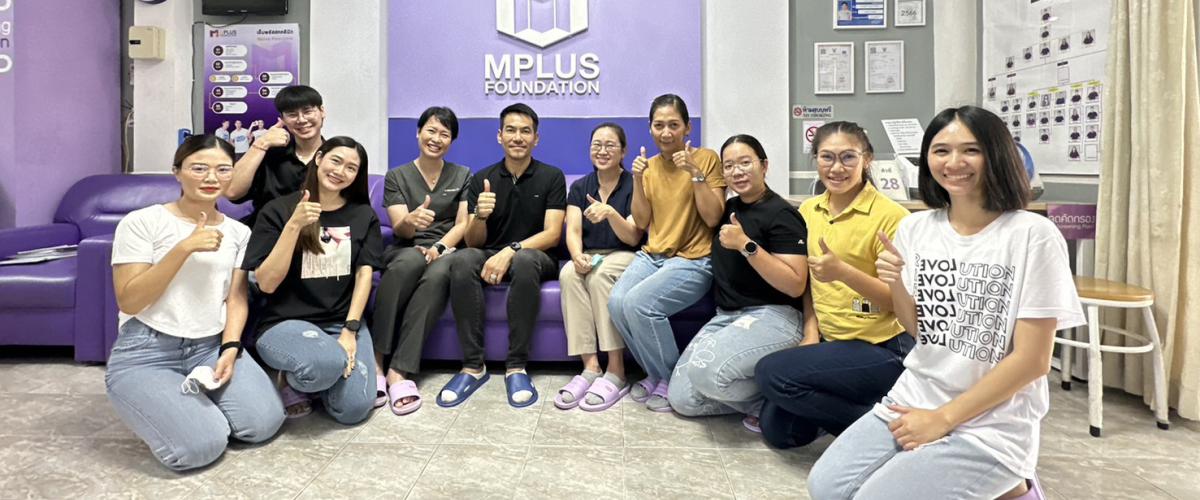Global Engagement Grant Recipient Hopes Research Will Optimize Health Outcomes for Transgender Community
Amaraporn Rerkasem, fourth from left, pictured with staff members involved in her research on neovaginal health among transgender women in Thailand.
Gender-affirming care is vital to the transgender community. And research that furthers this care plays a critical role in optimizing health outcomes.
That’s why Amaraporn Rerkasem, MD, set out to study the neovaginal health of transgender women in Thailand.
Rerkasem, of Chiang Mai University’s Research Institute for Health Sciences, is focusing on the microbiome of neovaginas in transgender women. The hope is that by examining the microbial communities, or bacteria, living in neovaginas she’ll be able to better assess how to maintain vaginal health and prevent infections.
There’s limited research on the microbiome of neovaginas, which are vaginas constructed by surgery, in transgender women. Neovaginas are used in gender-reassignment procedures or for cisgender women who need reconstructive vaginal surgery.
“We were motivated to conduct this research because a healthy neovagina is crucial for a robust immune system and protection against infections,” said Rerkasem. “Key bacteria, like Lactobacillus, play a role in maintaining vaginal health. It's interesting because factors such as hormones, sexual practices, hygiene, and background can affect the types of bacteria in the vagina. However, most of what we know is based on studies in cisgender women, leaving a gap in understanding for transgender individuals.”
Part of Rerkasem’s project is being funded by the Center for Global Health and Social Responsibility’s Global Engagement Grant program. Global Engagement Grants provide funding to University of Minnesota faculty, staff and students and support novel approaches to global health research.
Rerkasem is working on her research with Kumi Smith, PhD, MPIA, an assistant professor in the University of Minnesota’s School of Public Health who has extensive experience partnering with scholars in China to conduct research.
The funding provided through the Global Engagement Grant program will allow Smith to build new relationships and expand her research in Asia.
Rerkasem and Smith hope their project will be beneficial to transgender communities around the globe. Rerkasem added that working with the Prevention of Infection in Man Clinic at Chiang Mai University has established a strong foundation for LGBTQ+ healthcare research and collaboration.
“Many transgender individuals face barriers to accessing gynecological healthcare, and our study aims to address this issue by providing valuable insights into gynecologic health,” she said.
And while gender-affirming procedures are legal and widely available in Thailand, Rerkasem acknowledges that’s not the case in other parts of the world.
“Despite the visibility of transgender individuals in Thailand, discrimination persists, leading to challenges in accessing reproductive health services, substantial knowledge gaps in transgender health, and an increased risk of health issues, including sexually transmitted infections,” said Rerkasem.
“We are actively working to gather and analyze data to address these critical issues and contribute to the wellbeing of transgender individuals in Thailand.”
Rerkasem added that local organizations have helped encourage volunteers to take part in the research study. That support has played a big role in ensuring the study takes into account ethical and cultural considerations.
She said the MPLUS Foundation, a nonprofit that works with LGBTQ+ communities, has been particularly helpful in recruiting study participants.
“We want to express our heartfelt gratitude and appreciation for the support and partnership we've received in promoting and encouraging volunteers to participate in our research,” said Rerkasem. “To ensure that our research truly benefits the people we're studying, we've been working closely with community organizations and stakeholders.”
The project and international collaboration has been a rewarding experience, Rerkasem said, adding that without the funding from CGHSR the research wouldn’t have been possible.
“Our experience with the Global Engagement Grant program has been quite positive,” she said. “It's been more than just a grantor-grantee relationship; it's been a true partnership among academics.”
